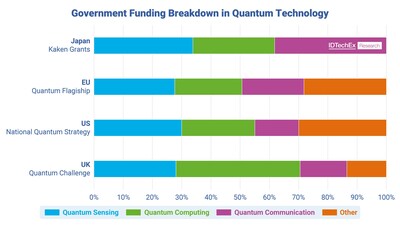In its analysis of both quantum technologies, IDTechEx has used comprehensive reports to separate hype from reality in order to compare the opportunities over the next ten years.
How do quantum computers and quantum sensors work?
How do quantum computers and quantum sensors work?
It is possible to initiate and manipulate quantum states using quantum hardware platforms. When combined with more established electronics, quantum phenomena enable new computing and sensing capabilities. The quantum computer requires a large number of entangled logical qubits for computation times to be exponentially reduced, with multiple competing methods of reducing errors and maximizing scalability, with the aim of reducing error rates.
The sensitivity of quantum states to external factors creates challenges for quantum computer developers, but the interaction between quantum states and properties such as motion, magnetic fields, and gravity facilitates quantum sensing through the interaction of these states with the surrounding environment. As a result, similar quantum hardware platforms can be adapted into quantum sensors and quantum computers as well. It includes superconducting circuits, photonic systems, cold atoms, and nitrogen vacancy centers in diamonds, among other things. There is more information about these technology platforms in IDTechEx's reports entitled "Quantum Sensors Market 2024-2044" and "Quantum Computers Market 2023-2033".
There is more information about these technology platforms in IDTechEx's reports entitled "Quantum Sensors Market 2024-2044" and "Quantum Computers Market 2023-2033".
An application-specific approach versus a vertical-agnostic approach
I don't think anyone would dispute the fact that the hype around quantum computers far outweighs the hype surrounding quantum sensors. Despite quantum computers regularly making headlines and featuring in science fiction and popular culture (including a recent episode of the TV series Black Mirror), quantum sensors have not yet made their way into the public eye.. There is no doubt that quantum computing often overshadows interest in quantum sensing even within the quantum technology community - just look at the agendas and abstracts for most industry conferences and you will see what I mean
There is no doubt that quantum computing often overshadows interest in quantum sensing even within the quantum technology community - just look at the agendas and abstracts for most industry conferences and you will see what I mean
Most of the attention that quantum computers attract is due to their simple elevator pitch: they promise a reduction in computation time by an exponential factor, making it possible to solve far more complex problems than are currently possible. We all use computers in our daily lives, so we are able to appreciate the prospect of having a computer that is much faster and more capable. The boom in interest in artificial intelligence (AI) in recent years has only served to amplify the interest in quantum computing over the last few decades. Moreover, it is important to keep in mind that while the specific problems quantum computing is suited to tackling within each industry may vary, the additional processing capabilities of a quantum computer are largely independent of the industry vertical in which it is used
Moreover, it is important to keep in mind that while the specific problems quantum computing is suited to tackling within each industry may vary, the additional processing capabilities of a quantum computer are largely independent of the industry vertical in which it is used
Contrary to the mapping of quantum computers from one technology to many applications, quantum sensors are far more application-specific as compared to quantum computers.. In fact, the 'quantum sensing' category represents a broad range of devices that can be used for a variety of purposes, with each having a limited number of specific applications. Among the types of devices that can be used are magnetic field sensors, gyroscopes, gravimeters, photodetectors, and even atomic clocks. Sensors of these types are used in a variety of applications, including remote current sensing in electric vehicles and biomagnetic brain scanning, as well as underground mapping and navigation with precision. It is therefore important to emphasize that the benefits offered by quantum sensing are specific to the industries of aerospace, automotive, geophysical surveying, and medical imaging as a whole. As a result of this technology-to-application specificity, quantum computing ecosystems are more fragmented than those of quantum computing, which dilutes the hype and competition associated with it
As a result of this technology-to-application specificity, quantum computing ecosystems are more fragmented than those of quantum computing, which dilutes the hype and competition associated with it
The difference between government funding and private funding
It is not always the case that column inches dedicated to new technologies are correlated with market opportunities. There is no indication that the relative lack of hype in quantum sensing indicates a lesser market opportunity in the short and medium term – rather, the opposite is more likely. As an example, one of the biggest influences on how quickly quantum technology will be brought to the market depends on the amount of funding available.
There are typically three types of government expenditures: computing, sensing (and imaging), and communications (networking). There are instances in which the amount of spending devoted to sensing, component manufacturing, and imaging is comparable to, or even exceeds, the amount devoted to quantum computing. It is evident that governments see societal benefits in supporting the development of quantum sensors in this allocation of funding.
Source prnewswire






No Comments